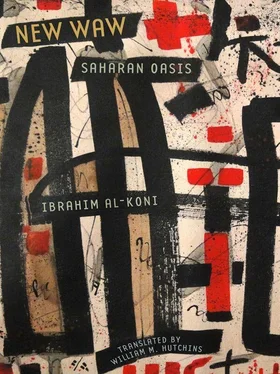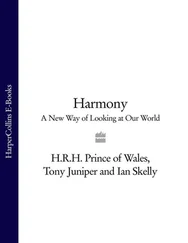It was reported that Aggulli asked the venerable elder, “Has it escaped our master’s attention that sword blades that stay hidden in their scabbards for long periods rust? What then will happen to these blades if they are thrust into the shadows of walls for an even longer time?” The group liked this riposte and repeated it to their wives in the privacy of their homes. Then it journeyed from these women’s tongues to the markets and from there found its way beyond the walls. The tribes praised it and other tribes adopted it as an argument in favor of their animosity to sedentary life and to settling down on the earth.
But this report also stated that Emmamma did not yield that day. Instead he stretched out his thin fingers, which resembled twigs, to pull the edge of his blue veil down over his small eyes, which were concealed by veils of blindness, and swayed back and forth before releasing a moan, which emanated from the land of eternity, asking, “Can’t you discover a technique to protect blades against rust?” The assembled men released murmurs of approval and also swayed back and forth ecstatically, whether from despair, desire for glorious past travels, or a hope for release from the bondage of the lowlands.
Then Aggulli replied with a cryptic phrase that channeled the calamity of the past and the calamities of times to come: “Far from it, Master. How preposterous!”
7
The wall extended from the northern heights, ran straight east where the earth dipped to make a hollow for the waters of Retem Valley, and wound toward the southern depressions to enclose groves of nab ‘ trees and date palms as well as the fields of crops. The Oases Gate was erected in this area, and through it entered caravans arriving from the forestlands and the Southern oases. The wall subsequently circled round to include the open space of the market and proceeded west to claim ancient plains where in earlier times truffles had grown in profusion. It finally reached the Western Hammada Gate, through which the salt caravans from Majazzen entered. The oasis also greeted caravans from the North there. Next the awe-inspiring wall continued its course northward to take in the masses of houses built on the heights, before terminating its severe, circular course at the place where the circular temple stood. Discriminating people discerned in this correspondence a coded sign. They said that the great wall’s circle was inspired by the circular shape of the noble mausoleum and that the men who had built the new structure had been inspired, perhaps unconsciously, by the plan created by the Lover of Stones.
8
Throughout this whole period, people did not simply treat Emmamma with the veneration they customarily showed toward elders and he did not merely inspire in their souls the secret dread that the sight of any person who has achieved a great age does. They viewed him, moreover, with the admiration due someone who had long struggled with time and defeated time for a long period.
In later years, when the tribe settled on the land and grew comfortable with sleeping inside walls, they noticed changes in their bodies and their souls. Then they realized that their venerable elder had already undergone these same changes. For the first time in his heroic struggle with time, he seemed to fall apart. He grew even thinner, his skin dried to his bones, and his limbs became extremely emaciated. He began to fade and fritter away. Nothing was left of his body except his enveloping veil and flowing thawb .
All that remained of his speech were his sorrowful moan and the sighs of lethal longing known only to one who has spent a long time alone in the wasteland or has lived as a stranger among people, because long ago he had voyaged off, entered the eternal, unknown lands, and had continued to speak to people from there. From these mysterious realms he addressed the people on the day they assembled to debate the right name for the oasis. He also wailed when he heard that they intended to call the new oasis “New Waw.” He chanted his lament lugubriously and finally raised his index finger to ask them critically, “Do you want to dangle the sword of extinction over the head of your new homeland? Don’t you know that those three letters have never been used to name a place on the earth without it incurring the Spirit World’s curse and without the ghoul of extinction striking it?” Some people retorted that extinction was the destiny of every existing thing and that venturing out into the wasteland was an invitation to fall prey to the belly of the wasteland. By yielding to this principle they should not hope that their Waw would become immortal, because its condition would be no more privileged than all the other Waws ever founded in the desert.
Finally Aggulli asked the venerable elder, “How can we hope to preserve anything that we, who are an evanescent people, have brought into existence? How can vanishing offspring knead something transitory with their hands and shape it into immortal dough? All existing things, Master, fade away, and everyone who is born dies.”
But the venerable elder, who was in immortality’s homeland, did not hear. He swayed back and forth again and sought inspiration for a name for the oasis from the Unknown. “The leader caused its birth. The leader is the father of the oasis. The leader is the master of the oasis. The leader is the name of the oasis: Tan Amghar. 12Name the oasis Tan Amghar. What a noble name! What a beautiful name!” He recited this for a long time and swayed back and forth for a long time, singing with a long moan. The noble elders did not conceal their delight with the name, but it was a name that lingered only on their lips, because the merchants with their caravans and the nomads had long since carried the name “New Waw” to the farthest nations.
______________
12. Land of the Leader, the Leader’s Land.
Ibrahim al-Koni, who was born in 1948, is a Tuareg whose mother tongue is Tamasheq. He immigrated to Switzerland in 1993 and currently resides in Spain.
Winner of the 2005 Mohamed Zafzaf Award for the Arabic Novel and the 2008 Sheikh Zayed Award for Literature, al-Koni has also received a Libyan state prize for literature and art, prizes in Switzerland including the literary prize of the Canton of Bern, and a prize from the Franco-Arab Friendship Committee in 2002 for L’Oasis cachée . In 2010 he was awarded the Egyptian State Prize for the Arabic Novel, and in 2011 Georgetown University organized a special conference devoted entirely to al-Koni’s works.
Al-Koni spent his childhood in the Sahara Desert. Then, after working for the Libyan newspapers Fazzan and al-Thawra , he studied comparative literature at the Maxim Gorky Literature Institute in Moscow, where he also worked as a journalist. He later lived in Warsaw for nine years and edited the Polish-language periodical as-Sadaqa , which published translations of short stories from Arabic, including some of his own. His novels The Bleeding of the Stone, Gold Dust, Anubis, The Seven Veils of Seth , and The Puppet have been published in English translation. At least seven of his titles have appeared in French, and at least ten exist in German translation. Representative works by al-Koni are available in approximately thirty-five languages, including Japanese.












